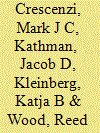|
|
|
Sort Order |
|
|
|
Items / Page
|
|
|
|
|
|
|
| Srl | Item |
| 1 |
ID:
117519


|
|
|
|
|
| Publication |
2012.
|
| Summary/Abstract |
In this paper, we examine how the past alliance behavior of nations affects the likelihood that these states will be involved in alliance formation. We contend that nations evaluate the reputations of potential allies when searching for alliance partners. Reputation information is processed by governments along with other immediate concerns. By introducing a model and developing subsequent measures of reputational alliance histories, we improve upon our current understanding of the factors that drive alliance formation. Using alliance reputation data derived from the ATOP project (1816-2000), we find support for the hypothesis that a reputation for upholding one's agreements significantly improves the likelihood of membership in future alliances.
|
|
|
|
|
|
|
|
|
|
|
|
|
|
|
|
| 2 |
ID:
079912


|
|
|
|
|
| Publication |
2007.
|
| Summary/Abstract |
This article investigates the role of direct and reputational information in the onset of interstate war. Scholars have recently identified the importance of separating the phenomenon of conflict from the rare event of war. Building on earlier work concerning the role of reputation and history in the onset of militarized interstate disputes, this article argues that states in crises face competing pressures brought on by their history of interactions with their opponents and their opponents' reputations generated through interactions with other states. While historical conflict reveals private information regarding the credibility of state demands, this history also generates constraints upon the ability of governments to seek peaceful resolutions to the current crisis. An empirical analysis supports the hypothesis that both a direct history of conflict within the dyad and reputational histories for conflict increase the likelihood of war onset. These results hold for a sample including all dyads 1817-2000 and a sample including politically relevant dyads in the same period. The results also suggest that contiguous states are more likely to go to war with each other, as are pairs of major powers, while democracies and pairs of minor powers are less likely to go to war with each other. These results support previous findings on the influence of these factors on the likelihood of war onset
|
|
|
|
|
|
|
|
|
|
|
|
|
|
|
|
| 3 |
ID:
109581


|
|
|
|
|
| Publication |
2011.
|
| Summary/Abstract |
We develop and test a theory of the supply side of third-party conflict management. Building on Kydd's (2003) model of mediation, which shows that bias enhances mediator credibility, we offer three complementary mechanisms that may enable mediator credibility. First, democratic mediators face costs for deception in the conflict management process. Second, a vibrant global democratic community supports the norms of unbiased and nonviolent conflict management, again increasing the costs of deception for potential mediators. Third, as disputants' ties to international organizations increase, the mediator's costs for dishonesty in the conflict management process rise because these institutions provide more frequent and accurate information about the disputants' capabilities and resolve. These factors, along with sources of bias, increase the availability of credible mediators and their efforts to manage interstate conflicts. Empirical analyses of data on contentious issues from 1816 to 2001 lend mixed support for our arguments. Third-party conflict management occurs more frequently and is more successful if a potential mediator is a democracy, as the average global democracy level increases, and as the disputants' number of shared International Organization (IO) memberships rises. We also find that powerful states serve as mediators more often and are typically successful. Other factors such as trade ties, alliances, issue salience, and distance influence decisions to mediate and mediation success. Taken together, our study provides evidence in support of Kydd's bias argument while offering several mechanisms for unbiased mediators to become credible and successful mediators.
|
|
|
|
|
|
|
|
|
|
|
|
|
|
|
|
|
|
|
|
|